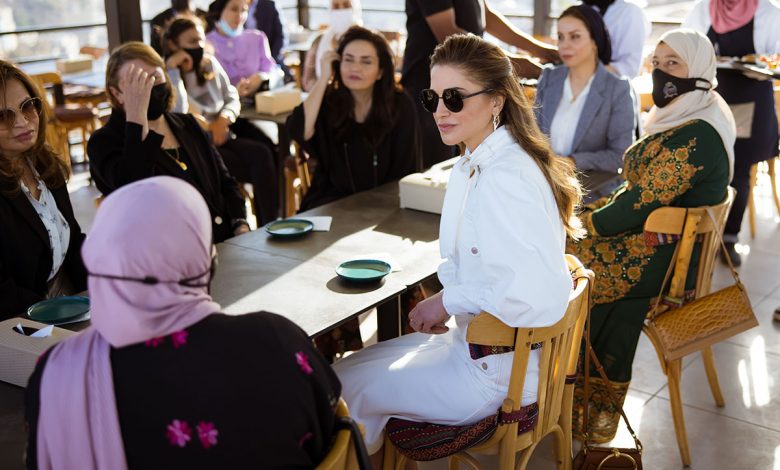
Jordan Daily – Her Majesty Queen Rania Al Abdullah visited Dar Ne’meh gift shop and café at the Amman Citadel on Monday, a project run by the Princess Taghrid Institute for Development and Training (PTI) that serves as a platform to market locally made products by women from across the kingdom.
Upon arrival at the Citadel, Queen Rania was received by PTI Chairwoman Her Royal Highness Princess Taghrid Muhammad, President, Mrs. Zein Majali, and Director, Mrs. Aghadeer Jweihan, who toured the facility with Her Majesty.
Dar Ne’meh, which means “The House of Bliss,” is a multipurpose facility that includes a gift shop, café, and traditional restaurant offering local food products, handicrafts, and souvenirs made by women from all over Jordan. Situated at the Amman Citadel, it provides visitors of the historic site with an experience of contemporary Jordanian culture, by introducing them to high quality handmade products, and allowing them to enjoy traditional dishes and beverages in the heart of one of Amman’s most scenic spots.
Her Royal Highness gave the queen a brief about the project, highlighting its importance in supporting Jordan’s tourism sector by marketing local handcrafted items made by skilled local beneficiaries.
After touring the shop and the café, Her Majesty met with some of PTI’s beneficiaries to hear about how Dar Ne’meh offers them employment and personal growth.
Dar Ne’meh, which has a second branch in Jabal Al Weibdeh, also markets its products at local bazaars and on online platforms. The project employs over 40 youth and women and supports over 150 vendors across the country.
Queen Rania also met some of the graduated orphans of the aftercare program run by PTI and sponsored by His Majesty King Abdullah through a royal initiative.
PTI is a local NGO established to solve the ongoing struggles faced by orphans and abandoned youth after the age of 16, by empowering them through training, skilling, and opportunities, with the objective of integrating them within their communities and alleviating social stigmatization.
The institute, which receives international support from foreign organizations and donors, runs centers to provide its services in eight other locations across Jordan.

